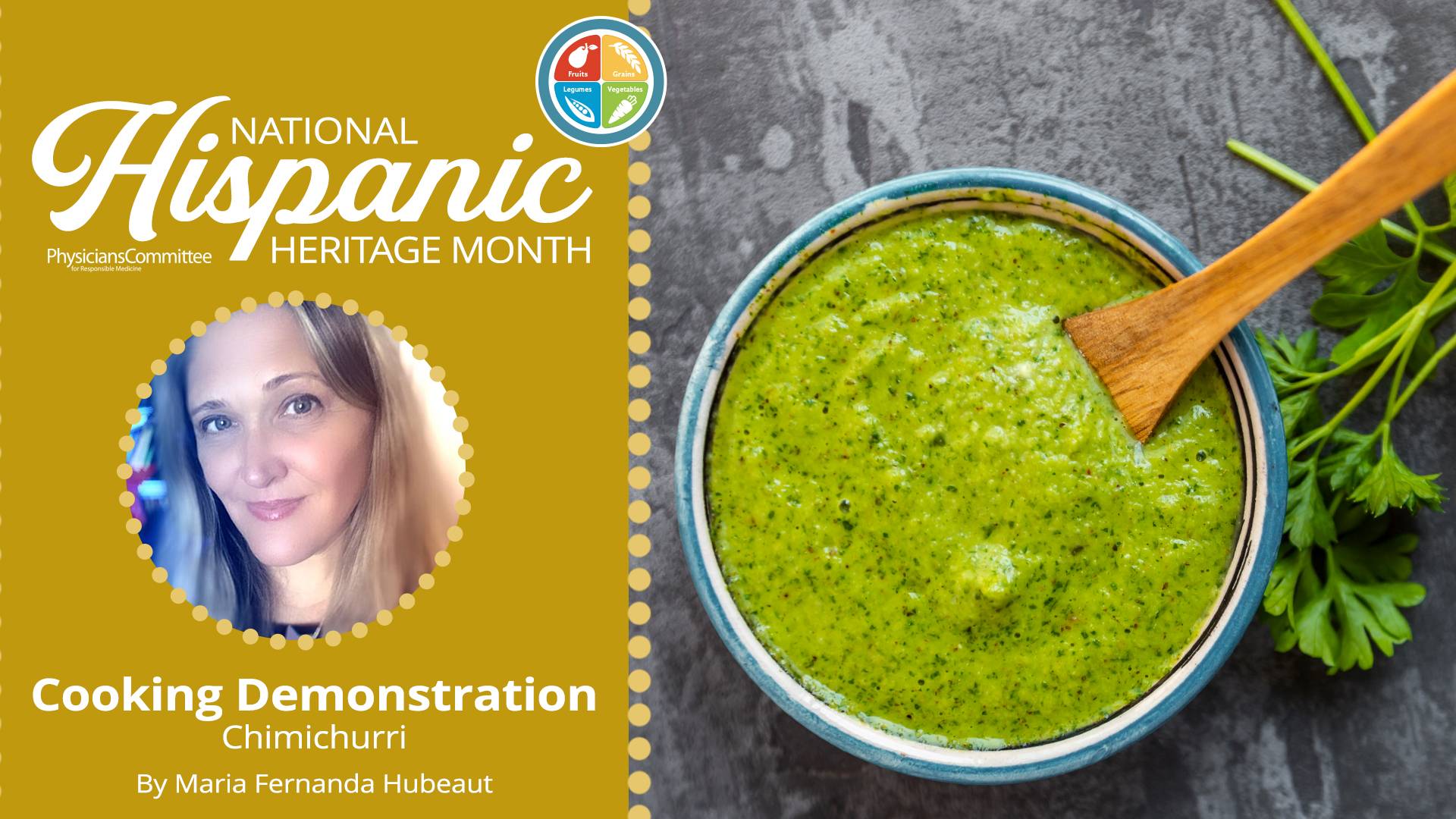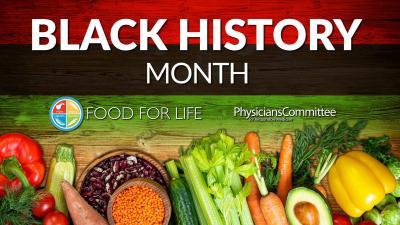Hispanic Heritage Month Plant-Based Cooking Demonstration: Chimichurri

The Physicians Committee’s Food for Life plant-based nutrition and cooking class program is celebrating National Hispanic Heritage Month (Mes de la Hispanidad), Sept. 15 to Oct. 15, with a series of cooking demonstrations that feature Food for Life instructors who are making recipes that honor the rich tapestry of Latin American flavors and traditions.
This week’s cooking demonstration was by Food for Life instructor Maria Fernanda Hubeaut, of Kingston, N.Y., preparing one of her favorites—chimichurri—from her native Argentina. This cooking demonstration is in Spanish.
“I chose to prepare the famous Argentinian dressing known as chimichurri because it is a classic of our gastronomy,” says Maria. “But, above all, because it evokes fond memories of my childhood with my grandmother Esther and my mother, Ana María, both excellent cooks. I never liked meat very much, and for me to eat it, they always made me chimichurri. I couldn't resist and completely covered the small piece of roast, almost burned, with this delicious green sauce, which made every bite irresistible. They used olive oil, tomatoes, and sweet bell peppers, or paprika, to give it a special touch that distinguished it from the typical chimichurri. That's why I decided to recreate this recipe without oil, trying to preserve that magical combination of unique flavors that is so special to me. I'm sure it will be a wonderful addition to your plant-based menu. I hope you enjoy it as much as I do!”
Previous videos in the series include Aifra Ruiz, of New York, N.Y., making tayota, carrot, and potato salad, from her native Dominican Republic; Elizabeth Garcia of Yakima, Wash., making red pozole, from her native Mexico; and Laura Rodriguez, of Monterrey, Mexico, making chipotle enfrijoladas.
ARGENTINIAN AND VEGAN CHIMICHURRI, WITHOUT OIL
By Maria Fernanda Hubeaut
Makes 3/4 cup, 4 servings
Ingredients
- 1 cup fresh Italian parsley
- 1 tablespoon fresh or dried oregano
- Juice of one lemon (you can also use wine vinegar, 2 tablespoons)
- 4 garlic cloves, minced
- 1 tablespoon soaked unsalted green pepita seeds (raw pumpkin seed)
- 1 pinch of sea salt or Celtic salt
- 1 pinch cayenne pepper
- 1 pinch cumin (optional)
- 4 cherry tomatoes (optional)
- Half a bell pepper or roasted sweet red pepper (optional)
- Water (about 2-3 tablespoons or as needed to reach desired consistency)
Directions
Process the parsley, garlic, and the spices (oregano, cumin, sea salt, and cayenne pepper) in a blender or food processor for about 20-30 seconds or until well blended. Add the green pepita seeds. Blend and gradually add the juice of half a lemon and water, if necessary, to reach the desired consistency.
Optional: For extra flavor and color, place the 4 or 6 cherry tomatoes and small sweet red pepper (or 1/4 if large) in an air fryer at 350 F (180 C) for 5 minutes. This will activate the flavor and antioxidant and anticancer properties of the lycopene present in these vegetables. Dice the roasted cherry tomatoes and pepper and add them to the sauce. Mix well. Place the chimichurri in a mason jar and let it sit for at least 15 minutes to allow the flavors to integrate. You can keep it in the refrigerator perfectly for 10 days.
This chimichurri is perfect for:
- Marinated grilled vegetables.
- Dressing your favorite salad.
- Using as a sauce for tofu or tempeh dishes.
- To serve with veggie burgers and portobello mushroom steaks.
This recipe is plant-based, low in calories, free of saturated fat, and high in vitamins C, A, and E, as well as being rich in antioxidants.
Nutrition Facts
Per serving: 25 calories, 1.3 g protein, 4 g carbohydrates, 0.5 g sugar, 1 g total fat, 37% calories from fat, 1 g fiber, 83 mg sodium
CHIMICHURRI ARGENTINO Y VEGANO, SIN ACEITE
Por Maria Fernanda Hubeaut
Rinde 3/4 taza, 4 porciones
Ingredientes
- 1 taza de perejil italiano fresco
- 1 cucharada de orégano fresco o seco
- El jugo de un limón (también se puede utilizar vinagre de vino, 2 cucharadas)
- 4 dientes de ajo picado
- 1 cucharada de pepitas verdes remojadas sin sal
- 1 pizca de sal marina o sal céltica
- 1 pizca de pimiento de cayena
- 1 pizca de comino (opcional)
- 4 tomates Cherry (opcional)
- Medio morrón o pimiento rojo dulce asado (opcional)
- Agua (aproximadamente 2-3 cucharadas o según sea necesario para alcanzar la consistencia deseada)
Instrucciones
Moler el perejil y el ajo en una procesadora junto con las especias (orégano, comino, sal marina y pimienta de cayena). Procesar todo por unos 20-30 segundos o hasta que quede bien mezclado. Añadir la cucharada de pepitas verdes remojadas y escurridas. Procesar o moler añadiendo poco a poco el jugo de medio limón y agua si es necesario para alcanzar la consistencia deseada.
Opcional: Para darle más sabor y color, colocar los 4 o 6 tomates Cherry y el pimiento rojo dulce pequeño (o 1/4 si es grande) en una freidora de aire a 180°C (350°F) durante 5 minutos. Esto activará el sabor y las propiedades antioxidantes y anticancerígenas del licopeno presente en estos vegetales. Picar los tomates Cherry y el pimiento asado a la salsa y revolver bien. Colocar el chimichurri en un frasco de cristal y dejar reposar durante al menos 15 minutos para que los sabores se integren. Se conserva en la heladera perfectamente por 10 días.
Este chimichurri es perfecto para:
- Marinar vegetales a la parrilla.
- Como aderezo de ensaladas.
- Acompañar platos de tofu o tempeh.
- Para servir con hamburguesas vegetales y bifes de hongo Portobello.
Esta receta es basada en plantas, baja en calorías, sin grasas saturadas, y alta en vitaminas C, A, y E, además de ser rica en antioxidantes.
Perfil nutricional
Por porción: 25 calorías, 1.3 gr proteína, 4 gr carbohidratos, 0.5 gr azúcar, 1 gr de total de grasa, 37% calorías procedentes de grasas, 1 gr fibra, 83 mg sodio








